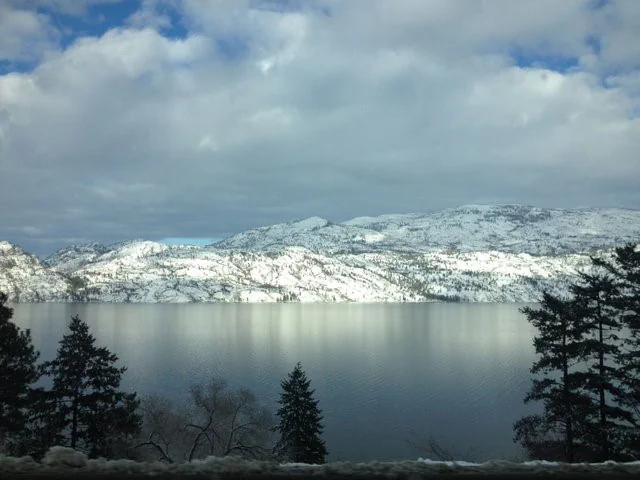Guided by our Biodiversity Conservation Strategy [PDF], OCCP looks to address challenges facing the lake, natural areas, and fish and wildlife by promoting a collaborative approach to biodiversity conservation and restoration. The Okanagan Lake Protection - Responsibility Planning Initiative, a partnership project with the South Okanagan Similkameen Conservation Program (SOSCP), and the Okanagan Nation Alliance (ONA) is aimed at identifying policies, regulations, and processes to enhance shoreline management for water source and natural areas protection for kɬúsx̌nítkw (Okanagan Lake).
Clean, plentiful fresh water and natural landscapes are a big reason why the Okanagan is such a great place to live. However, kɬúsx̌nítkw (Okanagan Lake) and surrounding natural areas are facing significant challenges from a growing population that is increasing development and recreational demand around the lake. These challenges if not managed properly can strain the lake’s ecosystem and have a detrimental effect on the health of kɬúsx̌nítkw (Okanagan Lake).
Did you know?
- Only 41% of the kɬúsx̌nítkw (Okanagan Lake) shoreline remains natural, the majority has been developed. Currently, there is little protection to maintain these natural areas.
- Increased shoreline development from 2009 to 2016, added 165 retaining walls, 164 docks, and 9 new marinas around the lake.
- The Okanagan Valley is biologically unique with some of the greatest concentrations of species and ecosystems in Canada. Many are found nowhere else in the country and in some cases the world.
In early December the OCCP, SOSCP, and ONA hosted a successful workshop, bringing together over 50 people from across the Okanagan representing non-governmental agencies, Indigenous communities, academia, and local and provincial governments from across the Okanagan. Those in attendance shared common challenges in their focus on protecting natural areas around kɬúsx̌nítkw (Okanagan Lake).
The workshop brought people representing diverse mandates in an effort to build relationships, understand different organizational processes, and become more aware of what each is doing in order to collaborate in protecting the lake, natural areas, and fish and wildlife. Additionally, the workshop illustrated important ties that protecting the lake and source water health also protects human health.
The Guiding Principles for the Okanagan Lake Protection - Responsibility Planning Initiative
- The aim of this project is to develop a collaborative visioning and planning process that will identify ways to care for and protect the environmental, economic, social, and cultural values of kɬúsx̌nítkw (Okanagan Lake).
- It is our collective responsibility to protect kɬúsx̌nítkw (Okanagan Lake) and its foreshore, tributaries, and watersheds for future generations, including terrestrial and aquatic plants, animals, and fish.
- No single entity can address the challenges facing kɬúsx̌nítkw (Okanagan Lake). Diversity of perspectives must be coordinated to create more resilient and dynamic responses to caring for kɬúsx̌nítkw (Okanagan Lake).
- This process will include meaningful engagement and shared decision-making processes that will establish and build mutually respectful relationships between Syilx Okanagan and non-Syilx Okanagan peoples.
- The planning process will include members and representatives of Syilx Okanagan Nation, provincial and federal agencies, local governments, academia, conservation organizations, and others who will be identified throughout the process.
- The process will have political and technical representation.
- The process will be founded upon Syilx Okanagan values, leadership, and knowledge weaved with western science to address the cumulative impacts on kɬúsx̌nítkw (OkanaganLake) caused by past and present human activities and natural processes.
- This process will identify and develop experiential learning opportunities to create a greater understanding of the challenges and solutions of caring for and protecting kɬúsx̌nítkw (Okanagan Lake).
- This process will include public and/or targeted community engagement that will gather input from community members, associations, and industry.
- It is anticipated that each partner will take on a commitment and responsibility in working towards innovative and effective ways to protect the values associated with kɬúsx̌nítkw (Okanagan Lake).
In 2020 ONA, OCCP, and SOSCP will be exploring the opportunity to invite workshop attendees and others to participate in a traditional Syilx Okanagan practice of an enowkinwixw process, in order to establish a common consensus towards developing a strategy for protecting kɬúsx̌nítkw (Okanagan Lake). The enowkinwixw is aa Syilx Okanagan process that is focused on creating a consensus-based understanding that is developed on the principles of respect, trust, and inclusion. The following principles/actions are embedded within the process:
- Consensus
- Establishment of common ground
- Protocols for discussion
- Full participation
- Commitment to see the process to its end, regardless of the time involved
- Differing perspectives (siya, spitlem, skemxist, ntyxtix) that have a defined place: Innovators, Traditions, Actions, and Relationships.
The process is complete when an action and implementation plan incorporating all views is in place.


Images credit: Okanagan Nation Alliance
The enowkinwixw provides participants an opportunity to think differently, make space for innovative ideas, while respecting and honouring traditional values and practices of the Syilx peoples. OCCP, ONA, and SOSCP will share more information on enowkinwixw in the new year.

